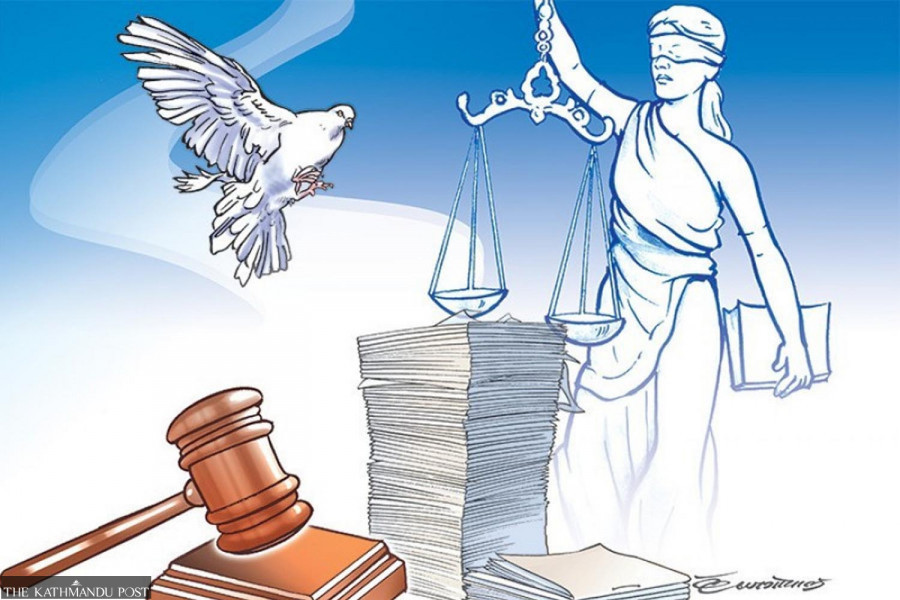National
11-member panel to forge consensus on transitional justice law amendment
Parties must understand any process rejected by victims will have no legitimacy, says conflict victim leader.
Post Report
The Law, Justice and Human Rights Committee of the House of Representatives on Friday formed a sub-committee to find a meeting point on the bill to amend the disputed Enforced Disappearances Enquiry, Truth and Reconciliation Commission Act. The 11-member panel has 21 days to submit its report to the committee’s plenum.
The government on March 9 registered an amendment bill in the House with some revision to the bill, which couldn’t get through the previous parliament. Seven years after the Supreme Court’s order, the erstwhile Sher Bahadur Deuba government in July last year had presented an amendment bill in the House with the provisions targeted at granting amnesty even in the cases of serious human rights violations.
The Deuba government didn’t wish to put the bill to vote as the CPN-UML demanded murder be listed as serious violation of human rights and there be a provision of appealing the decision of the Special Court, to be formed to decide on cases related to the transitional justice, in the Supreme Court among others.
The present bill has a provision that the decision of the Special Court can be appealed in the apex court. However, it retains the provision from the previous bill on murder.
Like the last year’s bill, the new one has listed ‘cruel murder’ or murder after torture, rape, enforced disappearances and inhuman and cruel torture as serious rights violations. The murder has been listed as just a human rights violation meaning it is an amnestiable offence.
Putting their views in Friday’s meeting of the House committee, cross-party lawmakers agreed that the formation of a sub-committee was necessary to sort out the differences among the parties over the bill. The top leadership of the parties had, on May 14, agreed to form the sub-committee.
“It is already too late for amending the transitional justice Act. If we believe in not delaying it further, there should be a subcommittee to find a meeting point among the parties,” said Ramesh Lekhak, Nepali Congress chief whip and a member of the sub-committee, in Friday's meeting.
Lawmakers have registered 28 revisions to the amendment bill. Mahesh Bartula, a UML whip and member of the subcommittee, said his party’s position hasn’t changed. “We are for the conclusion of the transitional justice process without delay. And revision to the Act is a prerequisite,” Bartaula told the Post. “However, we strongly believe the revision must be in line with the Supreme Court verdict ensuring prosecution is done in serious human rights violations including murder.”
The Supreme Court verdict in 2015 struck down around a dozen amnesty provisions in the Act, directing the government to amend it in line with international standards and practices. It asked for the categorisation of violence as ‘serious’ and ‘non-serious’ and ‘worthy of amnesty’ and ‘unworthy of amnesty’, depending on their severity. Though the bill has two categories of human rights violations, it has listed murder under non serious violation.
The conflict victims say while they are happy that the sub-committee will have a thorough discussion on the bill, as they want all the problematic provisions to be revised before the bill gets through Parliament. Other than listing murder as serious violations of human rights, the victims have demanded the constitution of a separate committee within the commission to investigate serious cases. They have also opposed the provision which envisions concluding the transitional justice process in two years. They say investigation of close to 67,000 cases, in two commissions combined, within two years doesn’t look practically possible.
“We are closely following the development. We believe the parliament addresses our concerns through the amendment,” Geeta Rasailee, vice-chairperson of Conflict Victims’ National Women Network, told the Post. “The parties must understand any process that is not accepted by the victims will have no legitimacy.”
The victims last week had requested Hanaa Singer-Hamdy, the United Nations Resident Coordinator in Nepal, to draw the concern of the Nepal government on the matter. “Though she didn’t explicitly say anything about the bill, she said the UN believes the transitional justice process must be victim-centric,” Rasailee told the Post. “We are confident that the UN position isn’t different from ours.”




 9.6°C Kathmandu
9.6°C Kathmandu













